
Psychological Safety relates, roughly speaking, to the belief that we shouldn’t be punished or humiliated for speaking up with our ideas, questions, concerns, or mistakes. Which, if you asked me, sounds pretty much like common sense. Fancy name apart — why did everybody jump on it as if it was the hottest thing since the invention of bread?
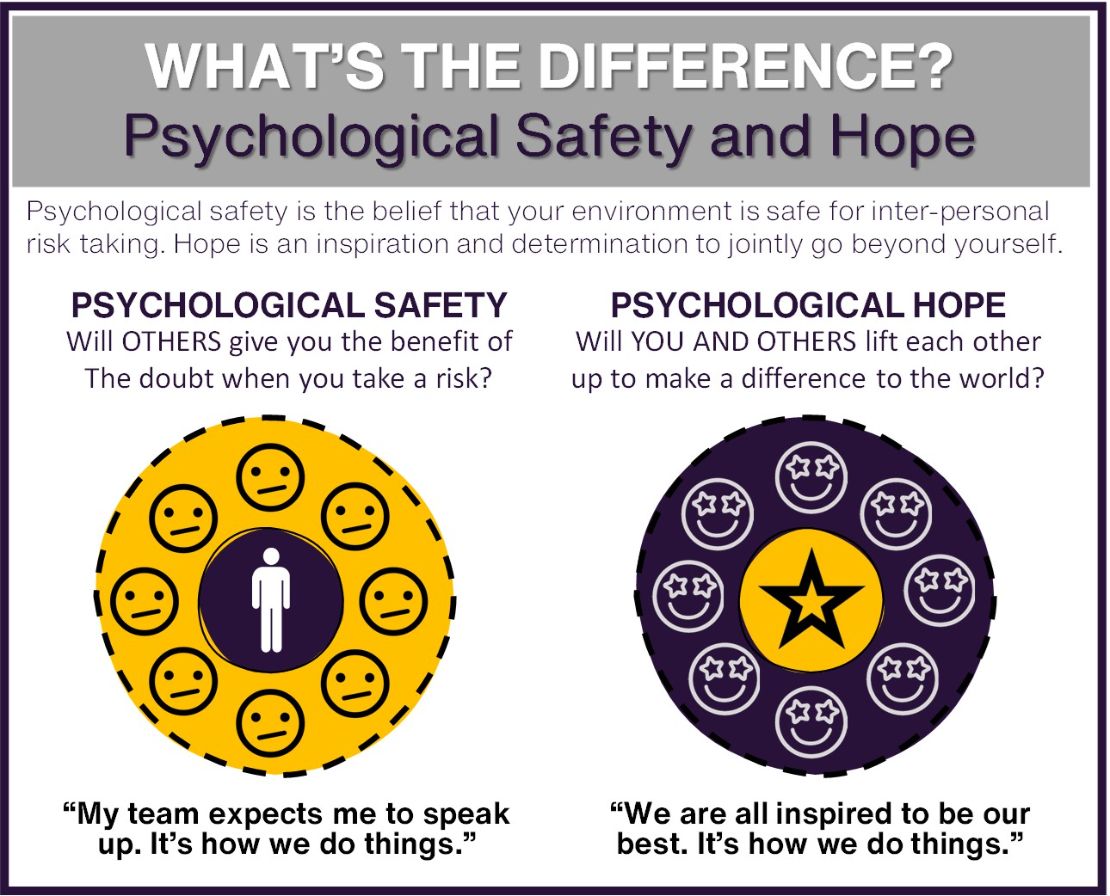
Psychological Safety relates, roughly speaking, to the belief that we shouldn’t be punished or humiliated for speaking up with our ideas, questions, concerns, or mistakes.
Which, if you asked me, sounds pretty much like common sense. Fancy name apart — why did everybody jump on it as if it was the hottest thing since the invention of bread? (To be fair — Amy Edmondson was equally surprised when it suddenly became an HR staple!)
We all know, you might quip, that common sense is terribly uncommon. So, this “new” concept made it finally legitimate for people (and HR) to call out rowdy behaviour in organisations. And its popularity proves that we still have lots of places where bad bosses behave like stone-age monkeys.
Good point! Only that I have a marginal suspicion that really nasty bosses would not care much about fancy academic concepts. Plus, in practice “psychological safety” seems to have often been used rather indiscriminately and superficially to mandate etiquette, sentimentalism or political correctness — or to suddenly demand from employees to be more agile, engaged and vocal to generate new ideas and processes. All of which might be helpful in some cases, but in others could quickly become an undue exercise of “socialisation” power (Foucault, anyone?). I guess we already have enough linguistic violence in management that infantilises adult employees — like growth mindsets, empowerment, fail fast, human capital etc.
Yes, but that certainly wasn’t the intention, you will object. Here I agree. And I am certainly not advocating organisations that use or tolerate fear, where employees are not able to speak up or have to suffer undignified or disrespectful working practices.
Still… I cannot lose the feeling that there is more. You know me. I always get nervous when “discourses” suddenly get dominant. I mean, just those words: “Psychological”. “Safety”. It is curious how the notion of “psychological” seems to acquire normative value. Why would something that is “psychologically observed” (i.e., an emotive or unconscious phenomenon) suddenly become a general rule for everybody? What if I claimed “psychological holidays”? The risk here is that the alleged normativity disguises its instrumentality — in fact, Google’s Project “Aristotle” (sic!) that popularised the concept was predicated on a definition of efficiency based on subjective views of “progress” and sales performance. If happier cows give better milk, we must make them happy. If safer cows…
Wait. What is it about “safety”? Why has the idea of “being safe” suddenly become sexy? Have we all become so terribly anxious in this “VUCA” (another problematic term!) world that even the most “basic” promise of protection sounds exciting? Or, is it that safety — see Hobbes — is simply a cardinal expression of individual, negative freedom? Is psychological safety just another way of saying: the only thing that matters is ME, MY emotions, MY thoughts, MY desires and MY absolute right to express them, whatever…? Does it, thus, become a social defense mechanism to avoid thinking more deeply about what it means to really act responsibly? And, by the same token, an expedient for organisations to “virtue signal” how responsible they are, a “psycho-washing” without real virtue? Who knows…
But I wanted to write about something else entirely! Often when HR consultants noisily call for more “psychological safety”, I sense they are approaching organisational transformation from the wrong angle. Let me explain:
Why do we have psychological risks in the workplace in the first place? Simple. Most of the risks exist, because organisations entail encounters between humans. So, why do we need safety? Easy. Beyond a need to sanction those truly abusive companies or bosses mentioned earlier (shame on them!), we want safety to challenge ideas, people or perspectives. Companies today need agility, collective learning and continual transformation.
Great! But there is the problem. Growth, learning and development are not simply about the absence of risk. They often require tension, conflict, and even crisis. Hence, in order to support individual and collective growth, we need to “stay with the trouble” and “hold the risk”. This requires “holding environments” where people care and take accountability for each other. More than eliminating risk, or offering immunity from emotional embarrassment or humiliation — what matters is mutual trust, inter-independence and a collective responsibility for “lifting each other up”. And we need to offer “public places”, to collectively deliberate. So that personal needs, ideas and desires can be transformed into collective and shared needs, ideas and desires — and where agents of such ideas are themselves transformed through their participation in the practice of community. Not even to mention resources — don’t expect people to contribute if they have no real rights, or do not participate in the benefits! So, transformation is not really about an individual “psychological state”, but about the collective crafting of INSTITUTIONS.
By the way, Amy shows herself (see below), that maximising psychological safety “by itself” could quickly dead end in the comfort zone.
Psychological Safety relates, roughly speaking, to the belief that we shouldn’t be punished or humiliated for speaking up with our ideas, questions, concerns, or mistakes.
Which, if you asked me, sounds pretty much like common sense. Fancy name apart — why did everybody jump on it as if it was the hottest thing since the invention of bread? (To be fair — Amy Edmondson was equally surprised when it suddenly became an HR staple!)
We all know, you might quip, that common sense is terribly uncommon. So, this “new” concept made it finally legitimate for people (and HR) to call out rowdy behaviour in organisations. And its popularity proves that we still have lots of places where bad bosses behave like stone-age monkeys.
Good point! Only that I have a marginal suspicion that really nasty bosses would not care much about fancy academic concepts. Plus, in practice “psychological safety” seems to have often been used rather indiscriminately and superficially to mandate etiquette, sentimentalism or political correctness — or to suddenly demand from employees to be more agile, engaged and vocal to generate new ideas and processes. All of which might be helpful in some cases, but in others could quickly become an undue exercise of “socialisation” power (Foucault, anyone?). I guess we already have enough linguistic violence in management that infantilises adult employees — like growth mindsets, empowerment, fail fast, human capital etc.
Yes, but that certainly wasn’t the intention, you will object. Here I agree. And I am certainly not advocating organisations that use or tolerate fear, where employees are not able to speak up or have to suffer undignified or disrespectful working practices.
Still… I cannot lose the feeling that there is more. You know me. I always get nervous when “discourses” suddenly get dominant. I mean, just those words: “Psychological”. “Safety”. It is curious how the notion of “psychological” seems to acquire normative value. Why would something that is “psychologically observed” (i.e., an emotive or unconscious phenomenon) suddenly become a general rule for everybody? What if I claimed “psychological holidays”? The risk here is that the alleged normativity disguises its instrumentality — in fact, Google’s Project “Aristotle” (sic!) that popularised the concept was predicated on a definition of efficiency based on subjective views of “progress” and sales performance. If happier cows give better milk, we must make them happy. If safer cows…
Wait. What is it about “safety”? Why has the idea of “being safe” suddenly become sexy? Have we all become so terribly anxious in this “VUCA” (another problematic term!) world that even the most “basic” promise of protection sounds exciting? Or, is it that safety — see Hobbes — is simply a cardinal expression of individual, negative freedom? Is psychological safety just another way of saying: the only thing that matters is ME, MY emotions, MY thoughts, MY desires and MY absolute right to express them, whatever…? Does it, thus, become a social defense mechanism to avoid thinking more deeply about what it means to really act responsibly? And, by the same token, an expedient for organisations to “virtue signal” how responsible they are, a “psycho-washing” without real virtue? Who knows…
But I wanted to write about something else entirely! Often when HR consultants noisily call for more “psychological safety”, I sense they are approaching organisational transformation from the wrong angle. Let me explain:
Why do we have psychological risks in the workplace in the first place? Simple. Most of the risks exist, because organisations entail encounters between humans. So, why do we need safety? Easy. Beyond a need to sanction those truly abusive companies or bosses mentioned earlier (shame on them!), we want safety to challenge ideas, people or perspectives. Companies today need agility, collective learning and continual transformation.
Great! But there is the problem. Growth, learning and development are not simply about the absence of risk. They often require tension, conflict, and even crisis. Hence, in order to support individual and collective growth, we need to “stay with the trouble” and “hold the risk”. This requires “holding environments” where people care and take accountability for each other. More than eliminating risk, or offering immunity from emotional embarrassment or humiliation — what matters is mutual trust, inter-independence and a collective responsibility for “lifting each other up”. And we need to offer “public places”, to collectively deliberate. So that personal needs, ideas and desires can be transformed into collective and shared needs, ideas and desires — and where agents of such ideas are themselves transformed through their participation in the practice of community. Not even to mention resources — don’t expect people to contribute if they have no real rights, or do not participate in the benefits! So, transformation is not really about an individual “psychological state”, but about the collective crafting of INSTITUTIONS.
By the way, Amy shows herself (see below), that maximising psychological safety “by itself” could quickly dead end in the comfort zone.
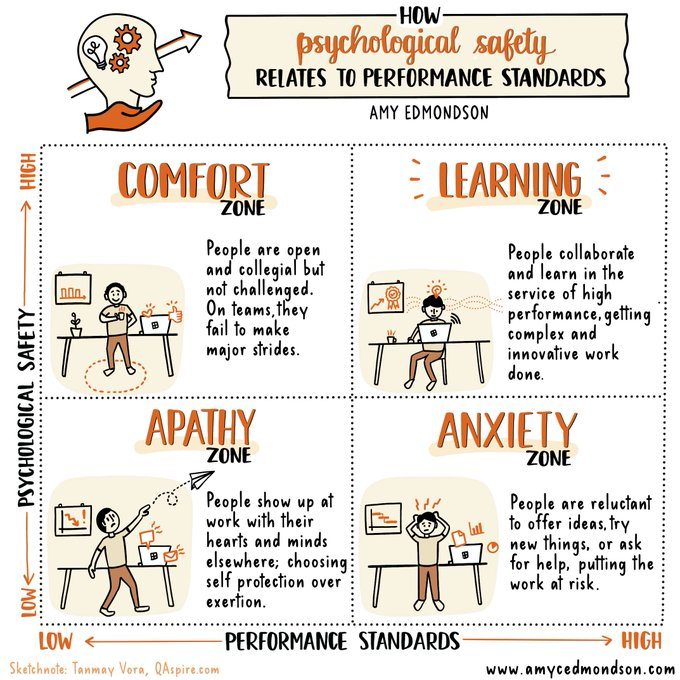
In fact, demanding risk-free organisations misses the existential fact that all people have their own ways of being. We cannot deny this away, but must enable spaces to contain mutual exposure and build relational resilience and "political" maturity and reciprocity. This is not about compromising, but about transforming our inter-personal dialogic ability to co-develop with each other. If we focus human organising on the elimination of risks for the individual, and simply seek to "immunise" ourselves from the necessarily ambiguous exposure to each "other", we might get more diverse "voices" in a meeting, but we won't truly construct a space to co-develop - and there is a real chance that we miss out on much of the aliveness of organisations altogether.
This is where I have always found the notion of "radical candour" more interesting than "psychological safety", because it endorses accountability - the idea is that we provide constructive or radical feedback, "because we care" about each other's growth. It is a reciprocate commitment to action, not just the absence of punishment or fear. However, I believe Kim Scott's concept focuses too much on just improving organisational performance, and too little on personal and collective growth. And sometimes it is abused to legitimise bullying or harassment. So, much more in line with Aristotle's (philosophical, not [modern positivist] psychological) thinking, I will suggest a move towards "virtuous friendships" that enable individual and collective flourishing…
In fact, demanding risk-free organisations misses the existential fact that all people have their own ways of being. We cannot deny this away, but must enable spaces to contain mutual exposure and build relational resilience and "political" maturity and reciprocity. This is not about compromising, but about transforming our inter-personal dialogic ability to co-develop with each other. If we focus human organising on the elimination of risks for the individual, and simply seek to "immunise" ourselves from the necessarily ambiguous exposure to each "other", we might get more diverse "voices" in a meeting, but we won't truly construct a space to co-develop - and there is a real chance that we miss out on much of the aliveness of organisations altogether.
This is where I have always found the notion of "radical candour" more interesting than "psychological safety", because it endorses accountability - the idea is that we provide constructive or radical feedback, "because we care" about each other's growth. It is a reciprocate commitment to action, not just the absence of punishment or fear. However, I believe Kim Scott's concept focuses too much on just improving organisational performance, and too little on personal and collective growth. And sometimes it is abused to legitimise bullying or harassment. So, much more in line with Aristotle's (philosophical, not [modern positivist] psychological) thinking, I will suggest a move towards "virtuous friendships" that enable individual and collective flourishing…
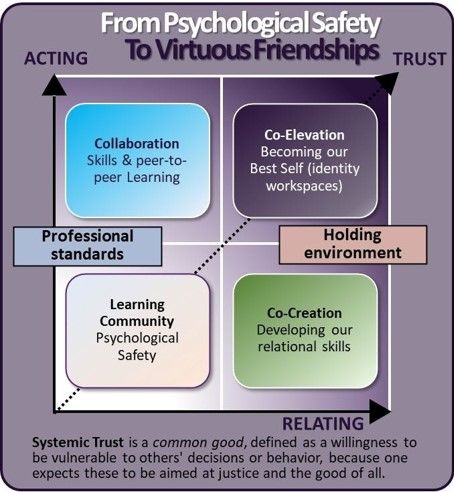
In a nutshell, psychological safety isn't an objective in itself, but only one (maybe important) indicator along the way. The objective, instead, is to create "good" organisations – which requires us to develop those professional standards and shared norms, to enable mutual accountability; to craft trusting social relations and foster personal development; and to install what the great philosopher called 'koinonia' - a political community that works towards a common vision.
And this is pretty tough. Herein lies the reality: true transformation is not a top-down installation of behavioural norms or the denial of risk - it is the slow, frustrating, difficult, and often unpopular change of individual and collective attitudes and behaviours. It is founded on the embracing of relational risks, rather than the avoidance of them.
Hence, the question might not be whether organisational spaces should be absolutely safe or not, but rather what kind of safety is desirable, and at which point our desire for safety becomes counter-productive. In the modern and sometimes superficial debate about "psychological safety" it often becomes a binary "either-or" question in which the opportunity to exercise judgment virtually disappears. But if we unconsciously reify an almost infantile denial of relational risk, and foster individual negative freedom at the cost of collective development - by quickly moving towards top-down rules, D&I programmes, or standards to eliminate alleged safety hazards - rather than inspiring a climate of care, instigating "liberating disciplines" and opening conversations about the "appropriate containing of the appropriate risks", we might be missing a trick.
But, above all, and herein lies the relevance of those "professional" performance standards, true transformation is about embracing and embodying a deeper inspiration. A "professional tradition" connects our activity with a higher good, nurtures our desire to both do better and become better, and stimulates us to work and compete with each other for the good essential to the activity itself.
You want psychology? Then let's call it "Psychological Hope" - an environment conducive and protective of mutual "co-elevation". Rather than safety, we need to create relational and institutional contexts that spark deeper motivation and stimulate teams to care for each other in the desire to collectively inspire their specific tasks, projects or products, and to create meaningful impact for their own life and others…
#transformation #leadership #GoodOrganisation #education #personaldevelopment
PS: Thanks to Rijon for pointing out the correlation with Project Aristotle, and for Spencer to point to "psycho-washing"!
Comments & Dialectics
On hope and self-determination theory
- C: Love it! As a positive psychologist I researched the development of hope at work and what organizations can do. We examined how people's hope benefits from satisfying basic psychological needs according to self-determination theory: satisfying the needs for autonomy, competence and relatedness (or purpose in Dan Pink's words). I love this emphasis on lifting each other up and making hope a focus!
- A: Very glad it resonates! Of course, I am trying to do a bit what Frank Martela does - connect virtue ethics with SDT, which does not really offer any foundation for that "transcendental pull". This is where Maslow, Ryan/Deci and many others were unwilling or unable to make the "leap of faith". Sadly, there is no good life with a merely psychological explanation of being - that's why Aristotle elegantly made "telos" both a psychological pull and a metaphysical ideal. We must dare to cross the Rubicon from our bleak empiricist landscapes into the enchanted world of transpersonal imagination. That is where safety fails. It tries to decorate Plato's allegorical cave, rather than daring to step into the sun of beauty, truth and good. And it quickly becomes simply another way to discipline the enlightened who upon return from the world of forms is "jeopardising the safety" of our own psychic prison. Sed fortasse liber in anima, said Seneca - but that freedom comes at a cost. We must leave the shores of personal safety to discover the lands of eudaimonic individuation… ;-)
The problem of common sense:
- C: Unless we come to terms with WHY common sense is absent from so many organisation, what good is it to suggest another common sense thing, even if we express it in better language?
- A: that is a great point. I need to ponder! Of course, here my first suggestion is to jump from a "psychology horse" (which can never get us anywhere) to a "philosophy horse" (which could get us somewhere, but over the last 2500 years of moral philosophy has arguably raced into all possible corners, country roads and dead ends on the planet of human imagination). So, the "pathway" is one of reasoning - intended as practical wisdom - not a change of emotional state. In other words, the implied problem with "common sense" is that people are fools. ;-) Not because they are stupid, but because they are "uneducated" - as Socrates suggests: "virtue is knowledge". He says, all people are good and if they fail to act wisely, they must be lacking understanding.But that is certainly too narrow. In fact, as Mats Alvesson suggests: "functional stupidity" is when a system induces clever people to do dumb stuff. It is not people being stupid, it is our system that makes them stupid. In a nutshell, my (underlying) suggestion here is that: people do things that are wrong, because they are not conscious or insufficiently (ethically) educated, or contextual conditions (institutional systems) seduce them to behave in the wrong way. In terms of solution, we are arguing with good old Aristotle where "phronesis" is the combination of consciousness and enacted (metaphysical) inspiration. That opens two pathways of change: education/consciousness and the change of "institutional" patterns of behaviours. But change, I guess I am also arguing, requires a transcendental "pull". We will not change our habits if there is not something deep and visceral driving us. So we must reconnect with something important, an eutopia, a sense of aliveness, a spirit. In other words, (faith and) hope. By that logic, we need to work on individual reasoning, collective institutions and social systems, and individual/collective behavioural habits… And get to some shared vision of a better future. No easy feast :-)) As Schumacher once pointed out: our "modern attempt to live without religion has failed."
The problem with religion
- C: I like where this is going. I get a sense that you know where the answer will come from, but are somehow afraid to go there? The problem is that people aren't just fools, they are sinners. God wrote a book for us, and it's emphatically clear on this. Just one example: "And this is the judgment, that the Light has come into the world, and men loved the darkness rather than the Light, for their deeds were evil." (John 3:19) Peter Drucker (heavily influenced by the Judeo-Christian worldview, although himself not a Christian as far is I know) knew this very well: "I'm only too aware that human beings perversely insist on behaving like human beings. This means pettiness and greed, vanity and lust for power and, yes, evil." That's the truth. Yet ever since the "enlightenment" we like to think that people are basically good and that all we need to do is to educate them. How did that work out so far? We need to understand and acknowledge our condition first. Then we can look for solutions from there. "The fear of the LORD is the beginning of knowledge." (Proverbs 1:7) Thoughts?
- A: Great thoughts - thanks! Well let's put it this way: depending on the day I'm between an idealist neo-platonic first principle, a disgruntled Nietzsche-esque existentialism and a hopefully naive aristotelian teleology. Venturing into dialogic monism is easy, moving to Augustinian dogma more difficult. As in Aristotle's hylomorphism my primary gaze is inwards, not upwards (as Plato's) and certainly not outwards (as Luther's). As David Norton (or Carl Jung) suggest individuation is "losing self to find self", not to go to heaven. But, what matters is the capacity for faith - in the James Fowler sense. Which brings me back to Schumacher and you: yes, we must step into faith (and certainly in the religious-philosophical sense hope is one part of faith). But not necessarily into divine revelation…
- C: Gazing inwards (if looking for truth and solutions) is exactly the problem: "The heart is more deceitful than all else" (Jeremiah 17:9). I'd be really curious to learn what makes you rule out Divine revelation.
- A: Great point, but of course the notion that "the heart" is inwards, is a misguided dualistic notion of the romantics. For Aristotle, inwards is metaphysical - it is the essential universal good residing in ourselves. 'T is what the Christians translated into 'imago dei', replacing the inward with the outward - thus, only in eternal life can we "see" the truth, in the eternal light of God. I do not rule it out, but I find it unnecessary and somewhat schizophrenic. If the good is outside me, as Plato's absolute form or in some (often ridiculously anthropomorphic) projection, then the individual disappears. Then my only cause is to become "him" (or her?), to ascend to BE that ideal. Not to BE me. This is what most people do not understand, and what Nietzsche rebelled against. Religious dogma must imply the annihilation of the self, qua human being. Any absolutism only knows "the individual", not "the person". And behavioural norms can only be inspired by some rationalist rules that allegedly support a religious eschatology. That, with all due respect, might be "helpful" as a socialisation device, but it is fundamentally totalitarian in its ontological grounding. And that… I cannot possibly endorse. ;-)
- C: Thanks, Otti. If I were to briefly summarise your argument: I cannot accept that there is a creator God who made me (and everybody and everything else there is), because that would mean I would have to accept that He also gets to define what is true. I'd rather define that myself. It's man's core problem: man wants to be autonomous, be his own God. He refuses to bow to objective truth outside of him. That leads to all sorts of vain speculation at best (but more likely to a messed up world, as we can witness). Of course you're free to think this way, but it that doesn't make it true. "For although they knew God, they did not honor him as God or give thanks to Him, but they became futile in their thinking, and their foolish hearts were darkened. Claiming to be wise, they became fools" (Romans 1:21–22) I can only plead with you to reconsider your position.
- A: What an intriguing conversation! Great challenge & very useful to summarize! No, that's not quite what I meant. When it comes to metaphysics, there is no easy access to "truth". There simply isn't a notion of "accepting a reality" (see chain of creation argument) - however loudly the orthodox may shout, there is only COMMITMENT to a reality. Hence, any assertion of ontological facts is intrinsically a hermeneutical act. The question is whether to abdicate agency for that act to a group of self-proclaimed experts who meet at councils to define an "objective truth", or whether it is better to nurture the agency in every person to navigate the "travails" of life finding contingently the best option. Both can be inspired by a universal spirit, but responsibility and agency work differently. Hence it is also not a question of "autonomy", a psychological concept, but "freedom", an ethical one. And here I am again with you: insisting on freedom without responsibility is immoral. But abdicating freedom to an extra-natural lawgiver is a peculiar device at the best of times, whatever its legitimising narrative. Hence, we must be careful with missionary zeal - rather than debating eschatology, I'd suggest we should focus on how to make a concrete action good. ;-)
- PS: I think one problem is that many proponents of religion (not saying you!) really forget they are in a corner of the onto-epistemological map that is not accessible by reason - to walk upon those metaphysical meadows requires what Plato called "the third eye" of intuition, ecstasy or divine revelation. Hence, there are no "reasons" for a specific religious dogma that we can easily demand others to endorse. Moreover, the argument of "truth" is not so quickly reconciled with normative legitimacy as people might think. Even if an omniscient creator God existed at any point in time - that would by no means automatically imply that everybody today should do as she/he/it did (people really should look at the old testament's demiurge a bit more closely ;-)), or indeed commanded - based on scriptures written and re-written over centuries by old white men. It might sometimes be just a tiny step from faith to fanatism. Anyway - thank you for your stimulating inputs! This is a fascinating and centuries-old conversation which is too often neglected in post-modern times. And it is hard to swallow that we need common ground to substantiate a just and good globalised society - as Arrows's impossibility theorem demonstrates, but apparently have no options left. Universalist dogma has long become ineffective in our pluralist and complex world - and has far too often deteriorated into not-so-benign dictatorship - so what are the solutions? Anybody's guess…
In a nutshell, psychological safety isn't an objective in itself, but only one (maybe important) indicator along the way. The objective, instead, is to create "good" organisations – which requires us to develop those professional standards and shared norms, to enable mutual accountability; to craft trusting social relations and foster personal development; and to install what the great philosopher called 'koinonia' - a political community that works towards a common vision.
And this is pretty tough. Herein lies the reality: true transformation is not a top-down installation of behavioural norms or the denial of risk - it is the slow, frustrating, difficult, and often unpopular change of individual and collective attitudes and behaviours. It is founded on the embracing of relational risks, rather than the avoidance of them.
Hence, the question might not be whether organisational spaces should be absolutely safe or not, but rather what kind of safety is desirable, and at which point our desire for safety becomes counter-productive. In the modern and sometimes superficial debate about "psychological safety" it often becomes a binary "either-or" question in which the opportunity to exercise judgment virtually disappears. But if we unconsciously reify an almost infantile denial of relational risk, and foster individual negative freedom at the cost of collective development - by quickly moving towards top-down rules, D&I programmes, or standards to eliminate alleged safety hazards - rather than inspiring a climate of care, instigating "liberating disciplines" and opening conversations about the "appropriate containing of the appropriate risks", we might be missing a trick.
But, above all, and herein lies the relevance of those "professional" performance standards, true transformation is about embracing and embodying a deeper inspiration. A "professional tradition" connects our activity with a higher good, nurtures our desire to both do better and become better, and stimulates us to work and compete with each other for the good essential to the activity itself.
You want psychology? Then let's call it "Psychological Hope" - an environment conducive and protective of mutual "co-elevation". Rather than safety, we need to create relational and institutional contexts that spark deeper motivation and stimulate teams to care for each other in the desire to collectively inspire their specific tasks, projects or products, and to create meaningful impact for their own life and others…
#transformation #leadership #GoodOrganisation #education #personaldevelopment
PS: Thanks to Rijon for pointing out the correlation with Project Aristotle, and for Spencer to point to "psycho-washing"!
Comments & Dialectics
On hope and self-determination theory
- C: Love it! As a positive psychologist I researched the development of hope at work and what organizations can do. We examined how people's hope benefits from satisfying basic psychological needs according to self-determination theory: satisfying the needs for autonomy, competence and relatedness (or purpose in Dan Pink's words). I love this emphasis on lifting each other up and making hope a focus!
- A: Very glad it resonates! Of course, I am trying to do a bit what Frank Martela does - connect virtue ethics with SDT, which does not really offer any foundation for that "transcendental pull". This is where Maslow, Ryan/Deci and many others were unwilling or unable to make the "leap of faith". Sadly, there is no good life with a merely psychological explanation of being - that's why Aristotle elegantly made "telos" both a psychological pull and a metaphysical ideal. We must dare to cross the Rubicon from our bleak empiricist landscapes into the enchanted world of transpersonal imagination. That is where safety fails. It tries to decorate Plato's allegorical cave, rather than daring to step into the sun of beauty, truth and good. And it quickly becomes simply another way to discipline the enlightened who upon return from the world of forms is "jeopardising the safety" of our own psychic prison. Sed fortasse liber in anima, said Seneca - but that freedom comes at a cost. We must leave the shores of personal safety to discover the lands of eudaimonic individuation… ;-)
The problem of common sense:
- C: Unless we come to terms with WHY common sense is absent from so many organisation, what good is it to suggest another common sense thing, even if we express it in better language?
- A: that is a great point. I need to ponder! Of course, here my first suggestion is to jump from a "psychology horse" (which can never get us anywhere) to a "philosophy horse" (which could get us somewhere, but over the last 2500 years of moral philosophy has arguably raced into all possible corners, country roads and dead ends on the planet of human imagination). So, the "pathway" is one of reasoning - intended as practical wisdom - not a change of emotional state. In other words, the implied problem with "common sense" is that people are fools. ;-) Not because they are stupid, but because they are "uneducated" - as Socrates suggests: "virtue is knowledge". He says, all people are good and if they fail to act wisely, they must be lacking understanding.But that is certainly too narrow. In fact, as Mats Alvesson suggests: "functional stupidity" is when a system induces clever people to do dumb stuff. It is not people being stupid, it is our system that makes them stupid. In a nutshell, my (underlying) suggestion here is that: people do things that are wrong, because they are not conscious or insufficiently (ethically) educated, or contextual conditions (institutional systems) seduce them to behave in the wrong way. In terms of solution, we are arguing with good old Aristotle where "phronesis" is the combination of consciousness and enacted (metaphysical) inspiration. That opens two pathways of change: education/consciousness and the change of "institutional" patterns of behaviours. But change, I guess I am also arguing, requires a transcendental "pull". We will not change our habits if there is not something deep and visceral driving us. So we must reconnect with something important, an eutopia, a sense of aliveness, a spirit. In other words, (faith and) hope. By that logic, we need to work on individual reasoning, collective institutions and social systems, and individual/collective behavioural habits… And get to some shared vision of a better future. No easy feast :-)) As Schumacher once pointed out: our "modern attempt to live without religion has failed."
The problem with religion
- C: I like where this is going. I get a sense that you know where the answer will come from, but are somehow afraid to go there? The problem is that people aren't just fools, they are sinners. God wrote a book for us, and it's emphatically clear on this. Just one example: "And this is the judgment, that the Light has come into the world, and men loved the darkness rather than the Light, for their deeds were evil." (John 3:19) Peter Drucker (heavily influenced by the Judeo-Christian worldview, although himself not a Christian as far is I know) knew this very well: "I'm only too aware that human beings perversely insist on behaving like human beings. This means pettiness and greed, vanity and lust for power and, yes, evil." That's the truth. Yet ever since the "enlightenment" we like to think that people are basically good and that all we need to do is to educate them. How did that work out so far? We need to understand and acknowledge our condition first. Then we can look for solutions from there. "The fear of the LORD is the beginning of knowledge." (Proverbs 1:7) Thoughts?
- A: Great thoughts - thanks! Well let's put it this way: depending on the day I'm between an idealist neo-platonic first principle, a disgruntled Nietzsche-esque existentialism and a hopefully naive aristotelian teleology. Venturing into dialogic monism is easy, moving to Augustinian dogma more difficult. As in Aristotle's hylomorphism my primary gaze is inwards, not upwards (as Plato's) and certainly not outwards (as Luther's). As David Norton (or Carl Jung) suggest individuation is "losing self to find self", not to go to heaven. But, what matters is the capacity for faith - in the James Fowler sense. Which brings me back to Schumacher and you: yes, we must step into faith (and certainly in the religious-philosophical sense hope is one part of faith). But not necessarily into divine revelation…
- C: Gazing inwards (if looking for truth and solutions) is exactly the problem: "The heart is more deceitful than all else" (Jeremiah 17:9). I'd be really curious to learn what makes you rule out Divine revelation.
- A: Great point, but of course the notion that "the heart" is inwards, is a misguided dualistic notion of the romantics. For Aristotle, inwards is metaphysical - it is the essential universal good residing in ourselves. 'T is what the Christians translated into 'imago dei', replacing the inward with the outward - thus, only in eternal life can we "see" the truth, in the eternal light of God. I do not rule it out, but I find it unnecessary and somewhat schizophrenic. If the good is outside me, as Plato's absolute form or in some (often ridiculously anthropomorphic) projection, then the individual disappears. Then my only cause is to become "him" (or her?), to ascend to BE that ideal. Not to BE me. This is what most people do not understand, and what Nietzsche rebelled against. Religious dogma must imply the annihilation of the self, qua human being. Any absolutism only knows "the individual", not "the person". And behavioural norms can only be inspired by some rationalist rules that allegedly support a religious eschatology. That, with all due respect, might be "helpful" as a socialisation device, but it is fundamentally totalitarian in its ontological grounding. And that… I cannot possibly endorse. ;-)
- C: Thanks, Otti. If I were to briefly summarise your argument: I cannot accept that there is a creator God who made me (and everybody and everything else there is), because that would mean I would have to accept that He also gets to define what is true. I'd rather define that myself. It's man's core problem: man wants to be autonomous, be his own God. He refuses to bow to objective truth outside of him. That leads to all sorts of vain speculation at best (but more likely to a messed up world, as we can witness). Of course you're free to think this way, but it that doesn't make it true. "For although they knew God, they did not honor him as God or give thanks to Him, but they became futile in their thinking, and their foolish hearts were darkened. Claiming to be wise, they became fools" (Romans 1:21–22) I can only plead with you to reconsider your position.
- A: What an intriguing conversation! Great challenge & very useful to summarize! No, that's not quite what I meant. When it comes to metaphysics, there is no easy access to "truth". There simply isn't a notion of "accepting a reality" (see chain of creation argument) - however loudly the orthodox may shout, there is only COMMITMENT to a reality. Hence, any assertion of ontological facts is intrinsically a hermeneutical act. The question is whether to abdicate agency for that act to a group of self-proclaimed experts who meet at councils to define an "objective truth", or whether it is better to nurture the agency in every person to navigate the "travails" of life finding contingently the best option. Both can be inspired by a universal spirit, but responsibility and agency work differently. Hence it is also not a question of "autonomy", a psychological concept, but "freedom", an ethical one. And here I am again with you: insisting on freedom without responsibility is immoral. But abdicating freedom to an extra-natural lawgiver is a peculiar device at the best of times, whatever its legitimising narrative. Hence, we must be careful with missionary zeal - rather than debating eschatology, I'd suggest we should focus on how to make a concrete action good. ;-)
- PS: I think one problem is that many proponents of religion (not saying you!) really forget they are in a corner of the onto-epistemological map that is not accessible by reason - to walk upon those metaphysical meadows requires what Plato called "the third eye" of intuition, ecstasy or divine revelation. Hence, there are no "reasons" for a specific religious dogma that we can easily demand others to endorse. Moreover, the argument of "truth" is not so quickly reconciled with normative legitimacy as people might think. Even if an omniscient creator God existed at any point in time - that would by no means automatically imply that everybody today should do as she/he/it did (people really should look at the old testament's demiurge a bit more closely ;-)), or indeed commanded - based on scriptures written and re-written over centuries by old white men. It might sometimes be just a tiny step from faith to fanatism. Anyway - thank you for your stimulating inputs! This is a fascinating and centuries-old conversation which is too often neglected in post-modern times. And it is hard to swallow that we need common ground to substantiate a just and good globalised society - as Arrows's impossibility theorem demonstrates, but apparently have no options left. Universalist dogma has long become ineffective in our pluralist and complex world - and has far too often deteriorated into not-so-benign dictatorship - so what are the solutions? Anybody's guess…
Other popular articles in the KnowledgeHub: Business Transformation
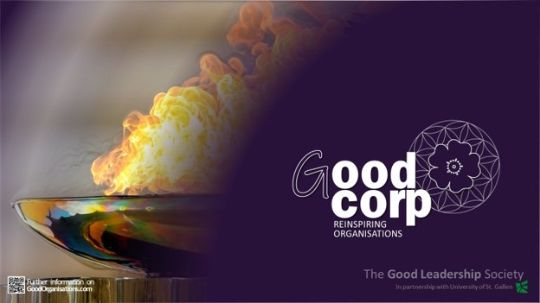

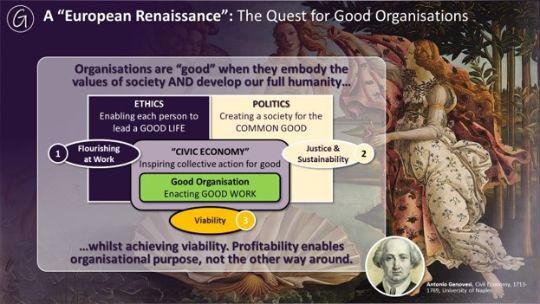
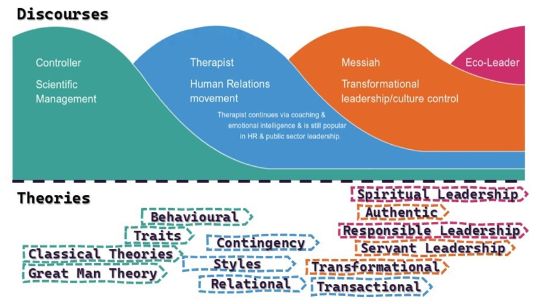
 .
.